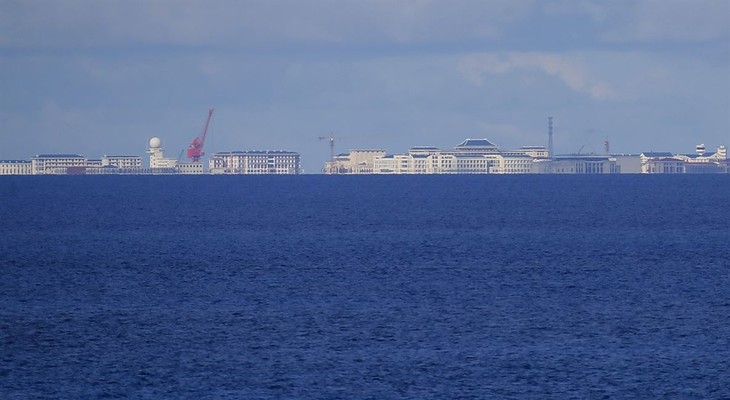China’s attempt to seize another island in the South China Sea failed (for now).
There has been a strategic battle taking place in the South China Sea this year between China and the Philippines. As you probably know, China has laid claim to most of the South China Sea and over the past decade has been using a strategy called the cabbage strategy to gradually claim individual islands.
The cabbage strategy involves surrounding islands with Chinese boats like the leaves of a cabbage. China starts with fishing vessels, dozens of which anchor around an island or shoal making it difficult for any other vessels to approach. Once that’s done, Chinese Coast Guard vessels move in to surround the fishing boats and formally prevent other boats from coming close. Having established control, the fishing boats go away and sends in construction equipment to militarize the island.
One of the islands China has its eyes on is called Ayungin Shoal or, to foreigners, Second Thomas Shoal. Ayungin Shoal is only a few miles east of Mischief Reef, an area that China has already claimed and heavily militarized. Both islands are well within the Philippines exclusive economic zone which stretches 200 miles to sea from the coast. Here’s a map showing Ayungin Shoal on the right and Mischief Reef on the left.

And here’s what Mischief Reef looked like in 2017 after China claimed it:

China would like to do the same to Ayungin Shoal but there’s a problem. Philippines has a permanent military presence there. It’s literally 8 soldiers occupying a rusted out hulk of a ship which the US donated after the Vietnam war. The Philippines beached it on the Ayungin Shoal in 1999, creating a makeshift military outpost. That’s a photo of the ship above. Here’s a closer view. As you can see, it’s a rust bucket.
In 1999 the Philippine Navy deliberately grounded an old US Navy ship on Second Thomas Shoal/Ayugin Reef in the Spratly Islands and kept it manned year-round as a South China Sea sentinel. It's been annoying China ever since and now China is upping … https://t.co/TypQ6YKuFd pic.twitter.com/coZa9XB2UG
— Chris Cavas (@CavasShips) August 9, 2023
But because the Philippines keeps that rust bucket constantly manned, China hasn’t been able to deploy the Cabbage strategy around the shoal. This year China has upped the ante in its efforts to seize the territory. Back in February, Chinese Coast Guard ships used
a powerful laser to temporarily blind resupply ships as they approached the shoal. The Chinese ship also maneuvered within 150 yards of the supply ship. Since then a kind of blockade has been in place. Earlier this month, Chinese Coast Guard vessels turned water cannons on resupply ships.
BREAKING:
The Chinese Coast Guard has used water cannons to attack a small vessel used by the Philippine Navy to resupply its Ayungin (Second Thomas) Shoal outpost.
The attack took place only 190 km from the Palawan island of the Philippines.pic.twitter.com/D2kQREWNPK
— Visegrád 24 (@visegrad24) August 6, 2023
There was some outrage after the water cannon incident but China pressed its luck claiming a former president of the Philippines, Rodrigo Duterte, had recognized their claim to the island. That brought a joint response from Japan, Australia and the US which announced last week that they would be holding naval exercises in the area.
The United States, Japan and Australia are planning a joint navy drill in the South China Sea off the western Philippines this week to underscore their commitment to the rule of law in the region after a recent show of Chinese aggression in the disputed waters, Filipino security officials said Sunday…
The U.S. plans to deploy an aircraft carrier, the USS America, while Japan would send one of its biggest warships, the helicopter carrier JS Izumo. The Royal Australian Navy would send its HMAS Canberra, which also carries helicopters, one of the two officials said, adding that the joint drill was planned a few months ago.
The Philippines would not be part of this week’s drills due to military logistical limitations but is open to becoming a participant in the future, the official said.
China apparently didn’t get the message. This Wednesday, China’s Coast Guard tried blockading the resupply boats again but this time Philippines sent along two larger Coast Guard vessels and the resupply boats got through the blockade after a standoff.
Two Philippine coast guard vessels escorting the supply boats, however, were blocked by at least four Chinese coast guard ships for about five hours in the tense standoff off Second Thomas Shoal…
The Philippine coast guard invited a small group of journalists, including two from The Associated Press, to join its ships that secured the supply boats as part of a new strategy aimed at exposing China’s increasingly aggressive actions in the South China Sea, which Beijing claims virtually in its entirety.
One Chinese coast guard ship came as close as 46 meters (50 yards) as it crossed the bow of BRP Cabra to block the Philippine coast guard ship, which maneuvered fast to avoid a collision, said a coast guard officer onboard the Cabra who could not be named because of official policy.
The Cabra and another coast guard ship, the BRP Sindangan, were forced to stop, surrounded by four Chinese coast guard ships and four suspected militia vessels, as the two boats delivered supplies to the Filipino forces at Second Thomas Shoal, more than 7 kilometers (4 miles) away.
Here’s a bit of what that looked like.
This isn’t the end of this battle. China will continue this blockade and perhaps up the ante some more.

